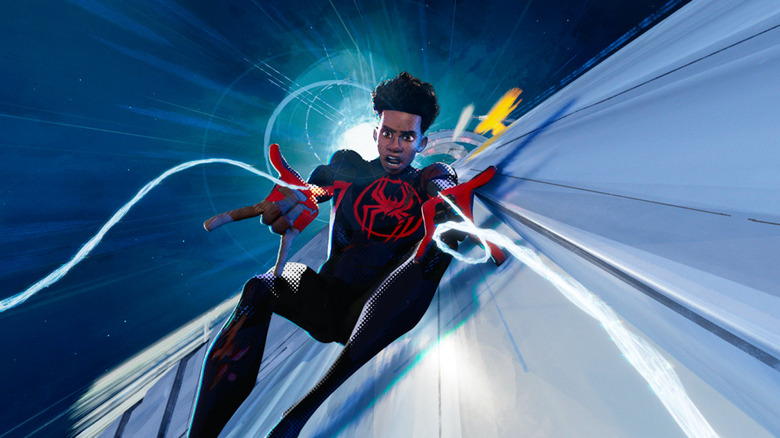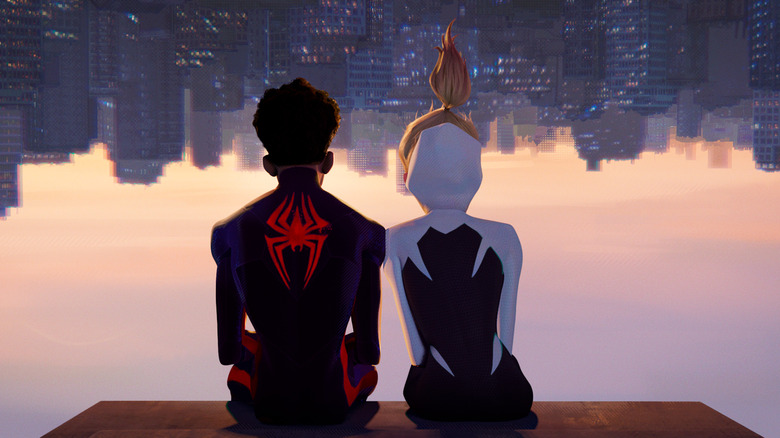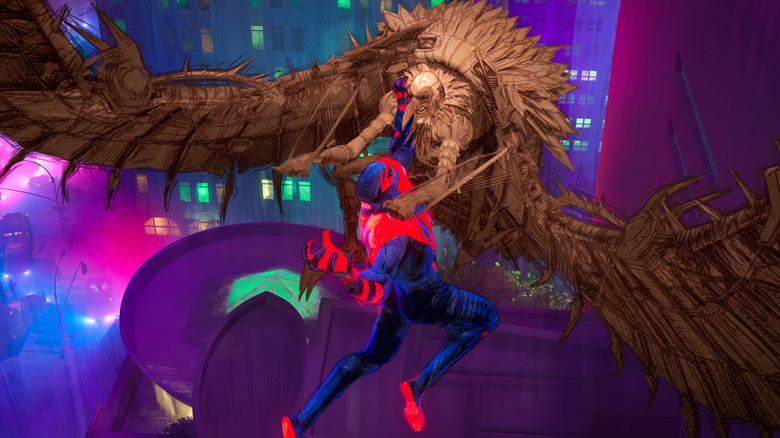Spider-Man: Across The Spider-Verse Review: The Best Half-A-Movie Ever
- Some of the coolest animation ever made
- Great heroes, villains, and characters in-between
- Demands to be watched multiple times
- It's still only half a story — "Beyond the Spider-Verse" can't come soon enough!
"Spider-Man: Across the Spider-Verse" was initially announced under the title "Spider-Man: Across the Spider-Verse (Part One)." Though the "Part One" might have been dropped from the name, this is still very much only half a complete story; we'll have to wait until next March to see how "Spider-Man: Beyond the Spider-Verse" (formerly "Across the Spider-Verse (Part Two)") concludes before we can fully assess the narrative as a whole. This is the one thing keeping me from immediately declaring "Spider-Man: Across the Spider-Verse" to be superior to its more narratively-complete predecessor "Spider-Man: Into the Spider-Verse."
What I can immediately say about "Spider-Man: Across the Spider-Verse" is that Sony Pictures Animation is two-thirds of the way to having one of the best movie trilogies of all time. This superhero sequel is the most entertaining film of the year so far — the sort of movie so great you find yourself questioning why other movies in its genre don't even attempt to play in the same league. The jokes are all funny, the action scenes are all spectacular, and the dramatic twists all hit hard. Even the copious fan-service, so often borne from cynical calculation in these franchises, comes from a place of pure excitement. Working under a new trio of directors (Joaquim Dos Santos, Kemp Powers, and Justin K. Thompson) but the same reliable producer team of Phil Lord and Christopher Miller, the "Spider-Verse" animators have pushed their art form even further than they did in the first movie.
Miles Morales grows as Gwen Stacy gains focus
"Spider-Man: Across the Spider-Verse" opens on Earth-65, the watercolor-painted universe Gwen Stacy, aka Spider-Woman (Hailee Steinfeld), calls home. Over an intense drum solo, Gwen's narration announces that this is the story of how she hurt her friend Miles Morales (Shameik Moore), preparing the audience for a darker, more tragic tale. Her personal background, given the quick montage treatment in "Into the Spider-Verse," is presented in further detail: We see how her universe's Peter Parker turned himself into the Lizard, and how her cop father blamed Spider-Woman for Peter's death. One of the most intriguing thematic threads in "Across the Spider-Verse" is its attempt to unpack how Spider-Man stories, including its own movie predecessor, address issues of policing.
While Gwen has been elevated to co-lead and primary narrator, this is still very much Miles' movie. He's dealing with the classic Spider-Man dilemma of trying to balance crime-fighting with school and familial obligations, all while holding onto his secret identity. He's unable to talk to anyone directly about this struggle, which eats at him. His father Jefferson (Brian Tyree Henry) is still awkwardly attempting to both understand and discipline him, while the concerns of his mother Rio (Luna Lauren Vélez) receive greater attention this time around. Miles has been lying to his parents so long that he doesn't know how he can tell them the truth — a situation that doesn't become any less complicated once Gwen returns to his universe.
Miles also has a self-proclaimed nemesis: The Spot (Jason Schwartzman), whose inclusion and execution in this film is a credit to how much fun these filmmakers know how to have with obscure comic book characters. A mad scientist with no face, portals all over his body, and a bagel-related origin story, he's a complete joke when he can't control his powers and the scariest villain imaginable once he gets a handle on them. Depending on how his story wraps up, he might be my new favorite Spider-Man movie villain.
There are other great antagonists here as well, even those who have reason to consider themselves "good guys." Given everything shown in the trailers, I don't think it's a spoiler to say that Miguel O'Hara (Oscar Isaac), the one Spider-Man without a sense of humor, comes to blows with Miles. There's also another antagonist who's been kept secret — and I'll say nothing of them except that their presence will sell you even more on needing to see the next part.
A marvel of animation
There are a lot of Spider-people in this movie. I couldn't say for certain that every Spider-Man shows up (they're surely saving some of them for the next film, right?), but it sure feels like it. Most are background characters. Several get funny one-off gags. A handful get bigger spotlights, including O'Hara, maternal motorcyclist Jessica Drew (Issa Rae), show off-y Pavitr Prabhakar (Karan Soni), and the returning Peter B. Parker (Jake Johnson) with his new baby daughter Mayday. My personal favorite of the bunch is Hobie Brown aka Spider-Punk (Daniel Kaluuya), a guitar-playing, fascist-fighting British Spider-Man who matches Nicolas Cage's Spider-Man Noir from the first movie at being simultaneously the coolest and most ridiculous Spider-Man around.
Spider-Punk is animated in a unique style: He's still a 3D computer-animated character, but he's designed to appear as if he's been constructed from newspaper clippings. I'm not sure how they did this effect but it looks incredible. He's just one example of how wild the animation gets in this movie. I don't think there's ever been a computer-animated film that looked this gorgeous, though notably, it's not exclusively CGI. Multiple 2D animation studios are credited on the film, and their styles are so painterly, it's hard to know where the 2D ends and the 3D begins. There's even some "Who Framed Roger Rabbit"-style integration of animation with live-action, as well as a sequence in a style near and dear to Lord and Miller's hearts.
At 140 minutes long, "Spider-Man: Across the Spider-Verse" is technically the longest American animated movie ever made, and yet it completely flies by. There's maybe one action sequence that goes a bit long and some of the spot-the-reference bits could be considered indulgent, but there's really nothing that needs to be cut and not much that could be cut. On the contrary, you just want to keep watching it. That it feels shorter than it is is as much a function of how involving it is as of the fact that it's telling such a big story and ending in a place we instinctively identify as a midpoint, rather than a conclusion.
"Spider-Man: Across the Spider-Verse" opens in theaters on June 2.


